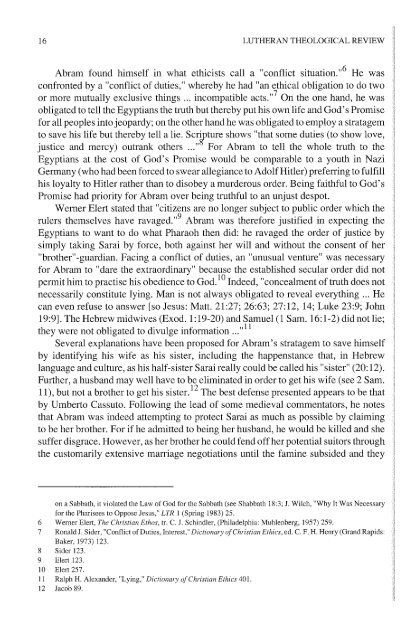ST. CATHARINES CONCORDIA - Brock University
ST. CATHARINES CONCORDIA - Brock University
ST. CATHARINES CONCORDIA - Brock University
Create successful ePaper yourself
Turn your PDF publications into a flip-book with our unique Google optimized e-Paper software.
16 LUTHERAN THEOLOGICAL REVIEW<br />
Abrnm found himself in what ethicists call a "conflict situation.^^ He was<br />
confronted by a "conflict of duties," whereby he had "an ethical obligation to do two<br />
or more rnutually exclusive tlii~~gs ... incompatible acts."7 On the one hand, he was<br />
obligatcd to tcll thc Egyptians the tmth but thercby put his own lifc and God's Promise<br />
for all peoples into jeopardy; on the other handhe was obligated to employ a stratagem<br />
to save his life but thereby tell n lie. Scri ture shows "that some duties (to \how love,<br />
justice and mercy) outrank othcn .."'For Abram to tcll rhc wholc truth to thc<br />
Egyptians at the cost of God's Promise would be cornparable to a youth in Nazi<br />
Germany (who had beenforced to swear allegiance to Adolf Hitler) preferring to fulfil1<br />
his loyalty to Hitler rather than to disobey a murderous order. Being faithful to Cod's<br />
Promise had priority for Abram over being Lruthl'ul to an unjusl despot.<br />
Wcmer Elert statcd that "citizcns arc no longer subjcct to public order which the<br />
sulers thelnselves have ravaged."' Abram was therefore justified 111 expecting the<br />
Egyptiansto want to do what Pharaoh then did: he ravaged the order of justice by<br />
simply taking Sarai by force, both against her will and without the consent of her<br />
"brotheru-guardian. Facing a conflict of duties, an "unusual venture" was necessary<br />
for Abram to "dare the extraordinary" because the established secular order did not<br />
pesmit him to practise his obedience to ~ od. l' Indeed, "concealment of truth does not<br />
necessarily constitute lying. Man is not always obligated to reveal everything ... He<br />
can even refuse to answcr [so Jcsus: Matt. 21:27; 26:63; 27:12, 14; Luke 23:9; John<br />
19:9]. The Hebrew midwives (Exod. 1:19-20) and Samuel (l Sam. 16:l-2) did not lie;<br />
they were not obligated to divulge infomnlion ... ,,l1<br />
Several explanations havc bccn proposcd for Abram's stratagem to save himsclf<br />
by identifying his wife as his sister, including the happenstance that, in Hebrew<br />
language and culture, as his half-sister Snrai really could be called his "sister" (20: 12).<br />
Further, a husband may well have to be eliminated in order to get his wife (see 2 Sam.<br />
ll), but not a brother to get his sister.12 The best defense presented appears to be that<br />
by Umberto Cassuto. Following the lead of some medieval comrncntators, hc notes<br />
that Abrain was indeed attempting to protect Sarai as much as possible by claiming<br />
to be her brothel-. For if he admitted to being her husband: he would be killed and she<br />
suffcr disgracc. Howcvcr, as hcr brothcr hc could fcnd off hcr potential suitors through<br />
the customarily extensive marriage negotiations until the famine subsided and they<br />
on a Sabbath, it violated the Law of God for the Sabbath (see Shahbath 18:3, J. Wilch, "Why It Was Necessary<br />
fur the Pl~uisees lo Oppobe Jeaua,' LTR 1 (Spririg 1983) 25.<br />
6 Werner Elert. The Chriscim~ Ethos, tr. C. J. Schindler, (Philadelphia: Muhlenberg, 1957) 259.<br />
7 Ronold J. Sides, "Conflict of Dutles, Interest." Dictionary ofCh~.istian Ethics, ed. C. F. H. Henry (Grand Rapids:<br />
Baker, 1973) 123.<br />
8 Sidcr 123.<br />
9 Llert 123.<br />
10 Elett 257.<br />
11 Ralph H. Alexander, "Lying," Diu~ioriuiy of Chrihriun Eflrics 401.<br />
12 Jacub 89.













